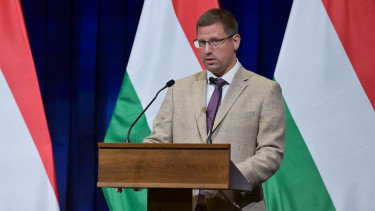Health care can no longer be financed as it has been

It has been three years since Covid pandemic broke out and the Europeans learned how to live with the consequences. But can you highlight some key lessons for the Hungarians, as well as all the European citizens and decision makers? What can be learned from the from the Covid crisis and what can the European health systems learn?
As I am basically an optimist, I always like to start with the positive lessons. I think we have really learnt that in times of a crisis of such magnitude, we need collaboration and cooperation. The best example for this is the vaccine purchasing process we had in the European Union, as this was the first time the European Union exercised its market power. The total EU market consists of 450 million people, so guarantees and volumes mean that there are opportunities for negotiating with the industry and with the producers.
Of course, this EU negotiating position was advantageous in terms of prices. The main lesson to take away from this is that burden sharing is always a good thing, because shared risks make a difference.
As a common market, the 27 governments together have collectively been able to do this risk sharing. I think it was a positive experience in many aspects. It was an important experience also because the EU has market power when in innovative medicines and high-priced medicines.
Why is this important from a European perspective?
In this case there is no shared European market. If a drug is available on the market of one European country it doesn’t mean that it is available on the whole European market. But after Covid, we’ve learnt that if the countries join forces, the result could be better, because the producers need guarantees when it comes to volumes, costs, and prices. The European market is fragmented, and not all the member states in the European Union have the same power. It’s always about economies of scale. But of course there were also really negative lessons from Covid.
Can you name some of these?
No country in the EU was prepared for such a public health crisis in terms of public health capacity. Nor did the systems have sufficient human resources in the health bureaucracy. The lesson is that we have to be really careful about capacity building in the public health sector.
The other thing that Covid has highlighted, there were no stockpiles of health supplies. Therefore, in order to be better prepared, in the future we need to stockpile at national level, but also at a shared European level.
Although understandable in some respects, but overall it was also negative that the handling of the pandemic crisis was politically hijacked by the heads of governments. This was because the decisions regarding lockdowns and massive restrictions regarding the people’s private lives naturally carry a high political risk. Prime Ministers or Chancellors have sought to be present in this process. But that also created tensions and problems in the management of the pandemic that could have been avoided.
I think that was the reason why, by the time we got the vaccines, some people had lost faith in the government’s actions, therefore many people did not take the vaccine. I must also say that there was no global mechanism for sharing the vaccines.
In your view, do we appreciate the work of healthcare workers more since Covid?
I think the people in the hospitals and in the in the healthcare sector have done a wonderful job because they really went over their capacities, but they also got exhausted very quickly. There was some appreciation in the beginning but without more political and financial support, it evaporates very quickly and people get frustrated and angry. But you know what the crisis has done? It has also amplified an underlying crisis within the institutions of institutionalised health work.
It has become clear that the health sector is still a very archaically organised sector.
What does it mean in practice?
Work processes are not very integrative, not very uplifting in this sector. It’s not very stimulating for the younger people especially. We need to change the attitudes towards work-life-balance, work processes and work culture. Workers are frustrated, not so much about the salaries, the main complaint is that they don’t have the freedom to develop in their work. The work culture is not good.
So, you’re saying that it’s not all about money and more money when it comes to financing the health care sector?
No, you don’t always need more and more money.
First we have to change the work culture in the healthcare sector,
as they did in banking or insurance. Of course, the richer countries can attract healthcare workers from Eastern parts of Europe, but it will only be better in quantity, not quality. It won’t change the work culture, they will get frustrated with the system and then start to drop out. Don’t forget, the nurses have the possibility to do other work. We have to be careful with this situation.
Once again, it's not only a question of rich or poor countries or high-income or middle-income countries. The attrition rate in the nursing sector is tremendous, so Germany, Austria cannot draw all the nurses from Romania or Bulgaria.
What do we need to do, change the work culture?
Yes, it would be the first and main step. The conversation we are having here when it comes to work processes and work culture is pretty new because we always thought that we can solve the problem with money. But we have to face this issue because this is the only choice.
In Hungary we can see that the government would like to control all the processes and people in the sector. What is the role of others?
I think there is very little the government can do when it comes to changing the work culture and the work processes in hospitals. If I had to advise the Minister of Health, I would say stay out of this kind of discussions because you are not operating and running a hospital. But we know that in many countries all the health workers are more or less public employees. So, politicians can go to the management of the hospitals and to the chief medical officers and ask them why my people, my employees are so unhappy, and ask them what they are going to do to change that.
So, in practise, there is a need - maybe it's the right term – for accountable management.
Exactly. The politicians have to make the hospital management accountable. We are seeing healthcare workers taking to the streets in many European countries. They're demonstrating, they're going on strike, they are exercising labour disputes in the street.
In your latest presentation in Budapest, another main topic was how can we finance the healthcare sector in an alternative way. How can we imagine this?
Before we get into this discussion, I have to make a distinction. I think traditionally developed health systems were financed quite well. In most of the Western European countries, health systems are financed via labour-related taxes or contributions and when it comes to high-income countries, this works very well. This is the main channel from which the resources come. But in the last couple of years, competition between state goals and spending has intensified: governments have to spend a lot of money on stabilising the financial markets, and are now investing more and more in the green economy. So you can’t finance everything with the same amount of tax, we have to be more creative, the governments have to be more creative.
It’s not sustainable to finance the rising costs of healthcare services from central budget subsidies.
What is your advice as to how the European states can do this? What can we do at the European level?
We need to find new sources of revenue as a source of funding.
In Europe, you cannot raise the labour taxes because of the competitiveness. When it comes to bad consumer choices, for me
the most important thing is nutrition, we eat too much highly processed food.
And these make us sick and unhealthy and kill us. For this problem, the regulation needs to apply to the whole European market. We need to ask what kind of market regulation we have regarding food and especially highly processed food. Because this is directly linked to the European health status. In my opinion, the industry cannot say that this is the consumer’s choice. No, it is not. The low-income people have no choice, they buy whatever is sold in the supermarket. They eat too much cheap food.
Címlapkép forrása: Shutterstock










